- Home
- Patrick Ness
What She Does Next Will Astound You Page 8
What She Does Next Will Astound You Read online
Page 8
There was something in the tone of that which Tanya took against. ‘I was just trying to be funny,’ she said.
‘Come on, April,’ said Ram, using his best ‘be reasonable’ voice, ‘let’s go look round the school, see what we can see and then reassess it.’
‘Sure,’ said April. ‘Sure. Of course. You’re right.’
And she walked out anyway.
TWENTY-TWO
THOUGHT YOU KNEW HOW TO LOSE YOUR FRIENDS? WELL, THIS WOMAN’S THIRTEEN BRILLIANT REASONS WILL CHANGE YOUR MIND
Charlie found Matteusz. On a bench. ‘Oh,’ he said, cramming all of his relief into that one word. ‘You’re okay.’
‘So, you care?’ Matteusz said. He looked cold and small and miserable, which considering his size was quite something.
‘Yes,’ said Charlie. ‘I’m sorry. I got it so wrong.’
‘You did,’ said Matteusz, holding him. ‘You amazingly did.’
‘Am I forgiven?’ Charlie said.
‘Yes.’
‘I had a speech.’
‘No problem.’
‘And a chocolate bar.’
‘I’ll take it.’
They walked away in the rain.
April watched them go. ‘I guess I’m alone now,’ she decided. She was sat on a low wall, sheltering from the rain. The school was so quiet. Bells rang but no one ran to class.
She fished her phone out of her pocket and tossed it from one hand to the next.
Something’s going on here. No one can agree on what to do about it.
She looked out at the wet square of tarmac.
‘I know what to do about it. But it’s not good.’
Video: How to Betray Your Friends and Influence People
‘Hi, my name is April MacLean, and this vlog is for Skandis.
I’m not going to jump off a roof.
I’m not going to cycle round the M25.
I’m not going to fight Audrey Maguire, even though she’s always hated me, and, anyway, who calls their daughter Audrey?
No. What I’m doing for Skandis is I’m telling you this:
I’m not sure I’ll ever know when I’m right.
I don’t know if I’ll ever win an argument. Nor if I would want to.
I’m worried I’ll only know how to enjoy being young when I’m really not young anymore.
I’m not sure I’ll ever be able to forgive my father. Sometimes I really resent my mother when she can’t look after herself.
Some of the time, when I’m playing music really intently, I’m doing it so that no one asks me how I’m really feeling. Because if they asked me, I’d start crying and I’d never stop.
I’m not sure anyone will ever be in love with me at the same time I’m in love with them.
Sometimes when I go to sleep I wish that I never wake up.
I care about causes, like refugees and recycling, but sometimes I just like to think it makes me look good. But all this charity stuff? Doing things for Skandis? It makes me sick. Do you know why? My mother needs care most days. No one, not even my best friends, has ever offered to help me with her, or even asked me how she’s doing. People at this school, doing stuff for charity? I’ve seen them laugh at her wheelchair. She’s been sworn at outside the shops because she gets a parking space. She’s been called a scrounger and told to get a job, even though she has one. Does that make me selfish? Vindictive? Yeah. Well, I don’t care. If you’re just doing something because other people are doing it, that’s not charity, that’s peer pressure. And I’m too tired to be bothered with fitting in.
Oh. And I really like folk music.’
April waited until the video had uploaded. Then she started to walk home. But she didn’t get there.
TWENTY-THREE
SHE WAS READY TO GIVE UP AND THEN A NURSE SLAYED HER WITH A WORD
April woke up.
April.
That was her name.
April had learned to be good at mornings. Especially over the last couple of years. A while ago, being a teenager before noon was EXHAUSTING. Now she aced it. Once it had been a chore to get out of the house and arrive at school before nine. Now she woke up, made breakfast for her and her mum (her mum said she was more than capable of doing it herself, but that wasn’t the point), talked with her, made sure Mum was feeling well enough to work (some days she really, really wasn’t), then showered, changed into clothes she’d washed and ironed herself (she did her own laundry—there should have been awards for that), and then got herself to school. Always on time. If not a little early.
‘Stop being so perfect,’ her mum had said to her recently.
‘I can’t.’
‘You’re like a robot.’
‘A really tired robot.’ They were having toast that morning, and it had somehow gone wrong. How was toast so complicated? It wasn’t like there were recipes for it.
Her mum wheeled herself over to the sink and reached up to rinse her plate. It just wasn’t a natural movement. Even though she was used to it, good at it, it never looked easy. Her mum reaching up for a tap like a child.
‘Let me do that,’ April said before she’d realised it. Her mum ignored her. She always did. Just carried on running the plate under the tap, hosing away those stubborn last few bread crumbs before slotting it into the dishwasher.
‘Why not be late today?’ suggested Jackie. ‘My shift doesn’t start for a bit. We could not do something.’ She closed the dishwasher. ‘We could defiantly not do something.’
‘Such as?’
‘Watch TV.’
‘TV is rubbish at this time. Unless you like cartoons.’ April had never really been a fan. Jackie relented, smiling.
‘One day you’ll regret always being on time. It’ll catch up with you.’
And now it had caught up with her.
She had a waking-up ritual. She allowed herself to enjoy her room, which sounded stupid, but it helped. After the car crash, she’d found she both couldn’t sleep and she couldn’t stand waking up. She started every morning miserable. She’d once read a book about a man who lived in a cave and started every day screaming. That. She’d woken up every day like that—barely enough time to blink before she remembered all the terrible things that had happened to her and which would make her miserable all day. Sometimes she couldn’t just remember them, they HAPPENED to her. Fresh. Free range. She’d hear her mother pleading with her father to slow down, to stop the car, to let them out, she’d hear herself screaming and begging and she’d hear the engine roaring and the song on the car radio, that song, and she’d wonder what she could have done to stop it as it was all her fault and that song and the way the road slid up at an angle, a roller coaster ride that she really hadn’t bought tickets for.
In short, she woke up every morning panicking. It was a nurse who helped her realise that.
April had come to visit her mum in hospital (she did it every day—there was nothing else to do, not for a while). She was waiting to go in, and the nurse came out of her mum’s room, closing the door gently. They kept telling her that her mum was doing fine, that there was nothing to worry about, but Jackie had her own room and this was the NHS. You only got your own room if you were dying. And very lucky.
April had started noticing these things. There was a reverential way of closing a door that only nurses used. It meant bad news. Later, when her mum was getting better, it was a different story. Doors would be flung open and nurses would bustle in, real cheeriness cranked up to eleven and all ‘Hello Jackie and how are we today Jackie and oh look it’s April and how are you doing April and isn’t the weather awful?’ But, for those first few touch-and-go weeks, the door to her mum’s room was closed so quietly and the nurses tiptoed away.
Except for this nurse. She had stopped and looked at April.
‘You look awful, hon,’ she said.
‘Thanks.’ April’s twisted smile said it all.
The nurse looked left and right and then sat down on the chair next to her. And
said nothing.
Eventually, April broke the silence.
‘You really don’t need to sit with me. It’s okay.’
‘No, I do. It’s more than fine.’ The nurse had one of those floating Jamaican accents that sounded like birds swooping among trees.
‘Don’t you have patients to look after?’
The nurse threw back her head and laughed as though she’d made a great joke. ‘I always have patients to look after. From when I come on shift to when I go home. Too many patients. You know what? If I look after all the ones I have, they give me more. I don’t get to all the ones I have? I stay late till I’m done. So, I’ll spend five minutes with you and make you feel better, then I’ll go and deal with the man in that room there . . .’ She pointed at the room over the way. ‘Handsome old man, very near the end. So racist. Keeps saying I’ve stolen his pills and his glasses. Calls me “little girl” when he wants to say something else. I should tell him “Say it, dear, let it out, you’re fooling no one.” But I don’t. I find his pills and his glasses and I tidy the pillow and I go make him a cup of tea the way he likes it.’ She folded her hands across her mint-green uniform. ‘I can spare five minutes for you. April, isn’t it?’
April nodded. ‘You said you could make me feel better?’
The nurse nodded. ‘You feel horrible when you wake up, don’t you?’
April nodded again.
‘It’s because a horrible thing has happened to you, you and your mum. You wake up feeling helpless and miserable and afraid, and you blame yourself. You can’t stop that. It’s natural. But, and this is the thing, that very first minute when you wake up and that great wave crashes down on you, tell it to stop. Take a breath. Look round your room. Feel at home. And tell yourself all the good things you’re going to do that day. Just list them.’
‘There aren’t many,’ April said.
The nurse looked comically angry at being interrupted.
‘Hush. Maybe there’ll just be two or three for now. Maybe there’ll be dozens. But try it and count them. Then, once you’ve run out of good things that you’re going to do—and I pray you don’t—then and only then, let that breath out and turn back to that old wave of misery and tell it to do its worst. And you know what’—the nurse leaned forward—‘it’ll still crash down on you, but it won’t be so bad.’
She’d stayed with April half an hour, chatting about her dogs and the coffee machines and where hospitals got their weird chairs from. But the advice was the thing that April remembered. Ever since, whenever she woke up, she’d look around at her bedroom, at the drapes, at the twinkling lights, at the mobile turning in the breeze, at the plants outside, and she’d enjoy how slightly too warm the duvet felt, that feeling of safety as she counted through all the things that she’d do today until she’d run out of breath.
Then, whatever happened, she’d be ready for it.
Not today.
April woke up.
She looked around herself. And it all went wrong.
She was in a small white room. She was lying on a small white bed. She was wearing a scratchy shirt. She was covered in a thin sheet and her head was resting on an even thinner pillow.
‘Where am I?’ she asked. ‘And where’s the door?’
TWENTY-FOUR
IF YOU DROPPED DEAD TOMORROW, WOULD YOUR FRIENDS MISS YOU?
‘Have you seen April?’ Ram asked Charlie.
‘No,’ said Charlie.
‘It’s just—have you seen the video she posted?’
‘I haven’t had a chance.’ Charlie rubbed the back of his neck and grinned sheepishly. ‘I’ve been kind of busy.’
‘Have you seen April?’ Ram asked Tanya.
‘No,’ she said. ‘Well, I’ve seen her video. Whoa.’
Ram leaned into the webcam. ‘Yeah,’ he said. ‘I’ve tried calling. And she’s not answering.’
‘We should totally not tell her mum,’ said Tanya.
‘Yeah,’ Ram said. ‘I’d not thought about that.’
‘Have you seen April?’ Ram asked Miss Quill.
‘Certainly.’ Miss Quill laughed and spun her laptop round. ‘I can’t stop watching her little video. Unlike her, it’s proving quite popular.’
She hit refresh. ‘Every little helps,’ she said, which would only make sense later. Then, even more bafflingly, she looked at Ram and winked.
TWENTY-FIVE
SHE THOUGHT SHE’D SEEN IT ALL AND THEN SHE SAW THE FACE OF GOD
April found the door eventually.
She found it by telling herself that there were limits to how unusual her world could get. Yes, her life was suddenly All About the Aliens, and true, she had an unwilling time-share on her heart with an alien king, but there were, she told herself several times, still going to be doors in her life.
She padded across the cold white floor of her small white room and she suddenly wondered where all that white was coming from. The room didn’t have a window. Nor did it have any visible lights. And yet there she was. In a white box. Maybe the walls lit themselves up somehow. Whatever, her first stop was going to be the walls. She started patting them.
‘There is a door in here somewhere,’ she said to the room. ‘Well, there’d better be as I really need to pee.’
Once she found the door it was obvious. There was a section of wall opposite the bed which, if you pushed it, swung open.
It led her into a white corridor. April raised an eyebrow.
‘I can see how this is going to go,’ she said to herself. She used her blanket to block the doorway of her room shut and then set out, tapping the walls, looking for answers, and, failing that, a bathroom.
Ten minutes later she’d discovered that, if she had been abducted by aliens, they had plumbing. Phew.
There was no sign of any toothpaste and her mouth was urgently telling her that it’d like some. She scooped some water from a tap and carried on.
At the end of the white corridor she found she was in another room. It all happened by optical illusion. The white corridor was perfectly, eye-achingly white. The room beyond was the same shade of white and completely empty. So, she walked from the corridor into the room with no realisation that she’d done so until it was too late.
The room she was standing in was, again, perfectly white. She couldn’t tell how big it was, only that her senses were screaming at her that it was huge.
She stopped walking. She turned around, trying to get an idea of how big the room was. She cupped a hand over her eyes, trying to shield them from the of her surroundings. It felt like sand was being rubbed into her optic nerves. She couldn’t stop blinking and there was an itch under an eyelid like she had a trapped lash. She rubbed it and that made it ten times worse.
WHITE
WHITE
WHITE
She decided she’d had enough of the white room. Then she realised she’d forgotten which way she’d come in. She couldn’t see the corridor anymore. She just knew that it was somehow somewhere. Unless this was some kind of trick.
She tried walking around, reaching out to touch a wall, but no matter how much she walked, she couldn’t feel anything. Then her knees buckled and she fell. For a moment there was dizziness, but then she realised—she could feel the floor. So she kept down and she crawled, sweeping an arm out in front of her in case, at any point, she met a wall.
No wall.
Realising that she had absolutely nothing to orient herself by, she stopped and got up onto her knees. She needed something. Even if it was a false centre. She was just wearing a long nightshirt. She gnawed one of the buttons off and put it down on the floor. It wasn’t quite white. Not completely. Sort of cream. It stood out, blaring its off-whiteness at her. She kept glancing back at it as she crawled away. Still there. Still there. Then gone. Utterly gone. She crawled back, defiantly, absolutely retracing her steps.
The button didn’t reappear.
Normal April, rational April, carry-on April would have taken that. But that Apri
l was taking a few heartbeats off. This April just flopped down in the whiteness. She rolled onto her back and made a snow angel. She giggled.
‘If it snowed here, how would you see it?’ a voice said. A moment later she realised it was her voice and that she sounded a little, just a little, crazy.
It was now that she heard the roaring sound. The pounding of the blood in her ears, growing louder and louder. That was her heart beating. Her weird alien heart. It was racing out of control. The nurse in the hospital had told her to enjoy being self-aware and now she was all too aware of herself.
April lay there. It was all way too much. For the first time in a long time, she just gave in.
Which was when the whiteness flickered.
Flickered like a screen. A face appeared.
The size was so large it could only be the face of God. The face filled the space, and that told her right now how small she was. She was lying on the floor of a vast cube. The face was projected onto all six faces of the cube. There was no escaping the face.
She could see all of it. The pores, the smile, the eyebrows, those clear blue eyes.
‘Hi,’ said the face of God.
It was Seraphin.
TWENTY-SIX
THIS TEACHER’S INSPIRATIONAL WORDS WILL CHOKE YOU UP
Miss Quill was the last person in the school.
It had that familiar quietness about it that told her, quite firmly, that it belonged to her. No Shadow Kin, no demons, no other aliens, and best of all, no children.
Just Miss Quill, face lit up blue by her laptop. April’s video was still playing on a loop.
‘I know exactly what you’re doing,’ she said to the screen.
Even though Miss Quill knew she was absolutely alone, she still looked from left to right before leaning into the screen and speaking again.
‘I know what you’re doing, April, and I admire it. Even if it will probably kill you.’

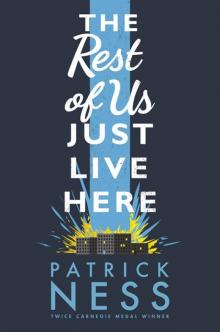 The Rest of Us Just Live Here
The Rest of Us Just Live Here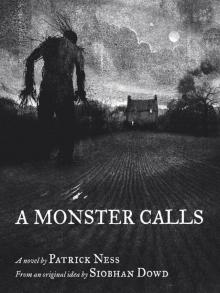 A Monster Calls
A Monster Calls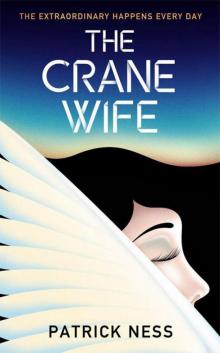 The Crane Wife
The Crane Wife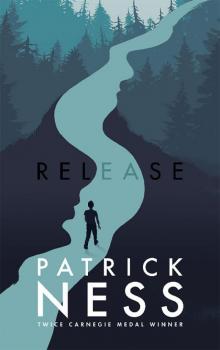 Release
Release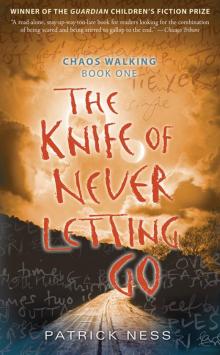 The Knife of Never Letting Go
The Knife of Never Letting Go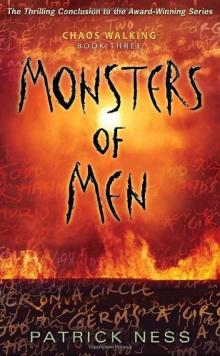 Monsters of Men
Monsters of Men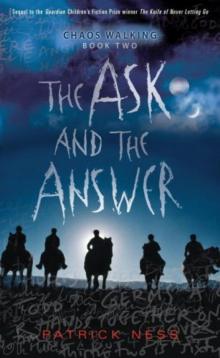 The Ask and the Answer
The Ask and the Answer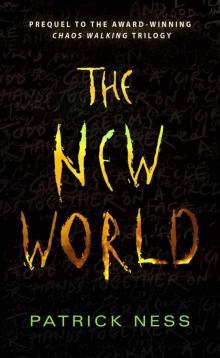 The New World
The New World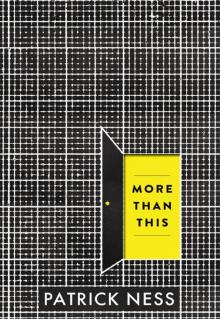 More Than This
More Than This Burn
Burn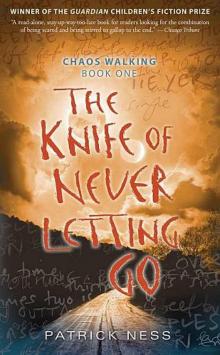 The Knife of Never Letting Go cw-1
The Knife of Never Letting Go cw-1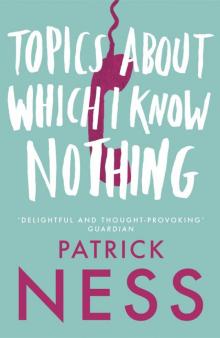 Topics About Which I Know Nothing
Topics About Which I Know Nothing And The Ocean Was Our Sky
And The Ocean Was Our Sky The Stone House
The Stone House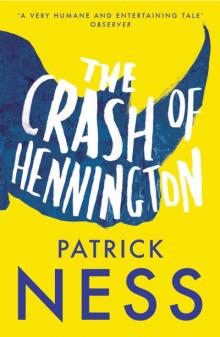 The Crash of Hennington
The Crash of Hennington Joyride
Joyride What She Does Next Will Astound You
What She Does Next Will Astound You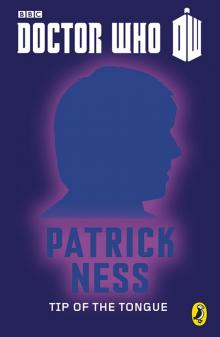 Tip Of The Tongue
Tip Of The Tongue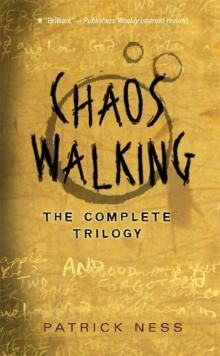 Chaos Walking
Chaos Walking